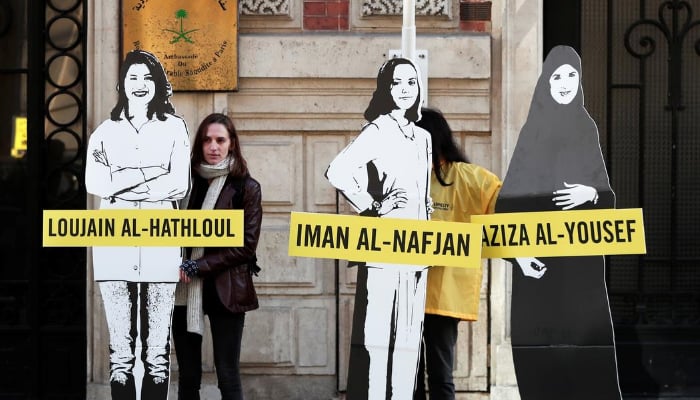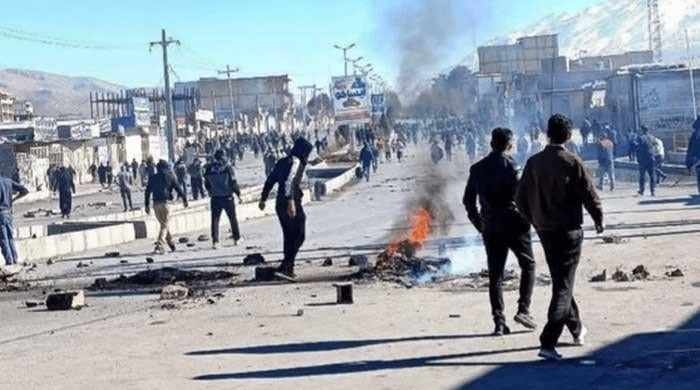Saudi women activists detail torture allegations in court
The hearing has drawn global attention after last year’s murder of journalist Jamal Khashoggi
March 28, 2019

RIYADH: Prominent women activists on trial in Saudi Arabia told a court on Wednesday they had been subjected to torture during more than nine months of detention, sources familiar with the matter said, in a case that has sharpened Western criticism of the kingdom.
The hearing, in which the women face charges related to human rights work and contacts with foreign journalists and diplomats, has drawn global attention after last year’s murder of journalist Jamal Khashoggi.
Those on trial include rights campaigner Loujain al-Hathloul, university professor Hatoon al-Fassi, blogger Eman al-Nafjan, and academic Aziza al-Yousef, who is in her 60s.
Sitting near their families inside Riyadh’s criminal court, some of the women described to a three-judge panel the mistreatment they had experienced, the sources said.
At least three of the women, including Hathloul, were held in solitary confinement for months and subjected to abuse including electric shocks, flogging, and sexual assault, rights groups have said.
Hathloul’s siblings allege that Saud al-Qahtani, a top adviser to Crown Prince Mohammed bin Salman, was present during some of the torture sessions and threatened to rape and kill her.
The Saudi public prosecutor has said his office investigated the allegations and concluded they were false. Reuters has been unable to reach Qahtani since he was fired in October over the Khashoggi murder.
“He’s the one who should be in court today, not my sister,” Walid al-Hathloul told CNN after Wednesday’s session.
Loujain asked for another month to respond to the charges after being granted only two hours with a lawyer to prepare, Walid added. There was no immediate response from the court.
The health of another woman, Nouf Abdelaziz, has deteriorated recently, London-based Saudi rights group ALQST reported this week, though the reason was unclear. One source said she had not appeared in court.
Western diplomats and media, including Reuters, were denied entry to the hearing and escorted from the building, despite petitioning to attend amid global scrutiny of the case.
Three dozen countries, including all 28 EU members, Canada and Australia, have called on Riyadh to free the activists. British Foreign Secretary Jeremy Hunt and his US counterpart both raised the issue during recent visits to the kingdom.
Nine prominent US senators wrote a public letter last week asking King Salman to immediately release of prisoners held on “dubious charges related to their activism”, citing many of the women currently on trial.
It remains to be seen if Riyadh will bend to international pressure — with the women possibly receiving acquittals or pardons — or pursue harsh sentences in a case critics say has revealed the limits of the crown prince’s promises to modernize Saudi Arabia.
Sending a message
Some of the charges against the women fall under part of the kingdom’s cybercrime law stipulating jail sentences of up to five years, according to rights groups.
Those against Hathloul include communicating with 15 to 20 foreign journalists in Saudi Arabia, attempting to apply for a job at the United Nations, and attending digital privacy training, her brother has said.
The public prosecutor said last May that some of the women, along with several men, had been arrested on suspicion of harming Saudi interests and offering support to hostile elements abroad. State-backed media labelled some of them as traitors and “agents of embassies”, irritating Western allies.
The detentions happened weeks before a ban on women driving cars in the conservative kingdom was lifted under efforts to relax social rules and boost the economy.
Activists and diplomats have speculated that may have been meant as a message to activists not to push demands out of sync with the government’s own agenda, but the crown prince has denied that, accusing the women of working for Qatari and Iranian intelligence.
Dozens of other activists, intellectuals and clerics have been arrested separately in the past two years in an apparent bid to stamp out possible opposition.
The crown prince has courted the West to support ambitious economic and social reforms, but his reputation was tarnished when Saudi agents killed Khashoggi at the kingdom’s Istanbul consulate, sparking an international furore.









